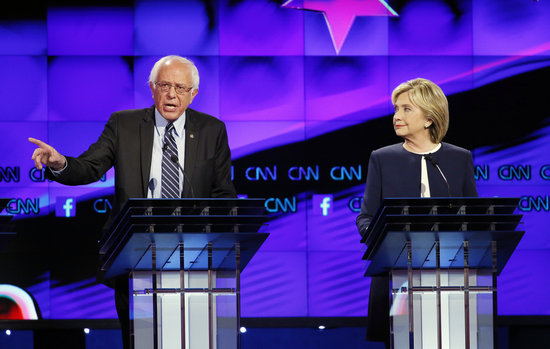Former Secretary of State Hillary Clinton on Tuesday vehemently defended the Obama administration’s decision to oust Muammar Qaddafi’s government in Libya and send diplomats there, despite the lethal attack on the U.S. consulate in Benghazi in 2012 that has given political fodder to her Republican opponents.
CNN debate moderator Anderson Cooper asked at Tuesday’s Democratic primary debate whether Clinton agreed with former Sen. Jim Webb (D-Va.) that the U.S. should never have made the decision to depose Qaddafi and that the Benghazi attack was “inevitable” result of that invasion.
Clinton began, not by addressing the Benghazi attack and her management of it, but by defending the invasion itself.
“We had a murderous dictator Qaddafi who had American blood on his hands, threatening to massacre large numbers of the Libyan people,” Clinton said. “We had our closest allies in Europe burning up the phone lines begging us to try to help them try to prevent what they saw as a mass genocide, in their words. And we had the Arabs standing by our side, saying, ‘We want you to help us deal with Qaddafi.’
“Our response, which I think was smart power at its best: We will not lead this, we will provide essential, unique capabilities that we have,” Clinton said. “We did not put one single American soldier on the ground in Libya.”
Clinton noted that in addition to saving Libyan lives, the U.S. intervention produced the first free elections in the country since 1951.
Forces outside of U.S. control, Clinton said, created the violent setting in which the Benghazi attack occurred a year later.
But Clinton said she did not regret sending the late Ambassador Chris Stevens to represent the United States in Libya, arguing that it is part of the cost of diplomacy.
“Because of the Arab spring, because of a lot of other things, there was turmoil to be followed,” Clinton said. “But unless you believe the United States should not send diplomats any place that is dangerous, which I do not, then when we send them forth, there is always potential for danger and risk.”
Rather than criticize Clinton’s handling of the Libya intervention or the attack on the consulate in Benghazi, former Maryland Gov. Martin O’Malley said that the Benghazi attack was a reason to shore up U.S. human intelligence sources.
“We need to do a better job as a nation of having human intelligence on the ground so that we know who the emerging next generation leaders are that are coming up to replace a dictator when his time on this planet ends,” O’Malley said. “I believe that is what Chris Stevens was trying to do, but he did not have the tools.”
Libya is currently in the grip of a brutal civil war in which an Islamist government in Tripoli and a military government in eastern Libya are competing for power. Amid the chaos, groups affiliated with the Islamic State have developed a foothold in the country.



